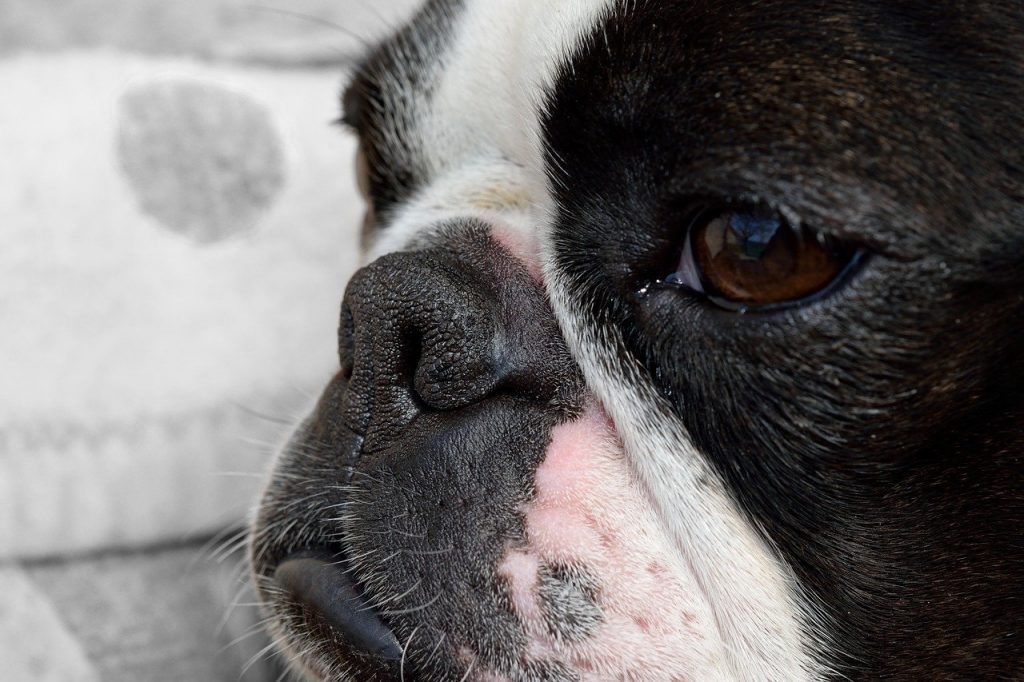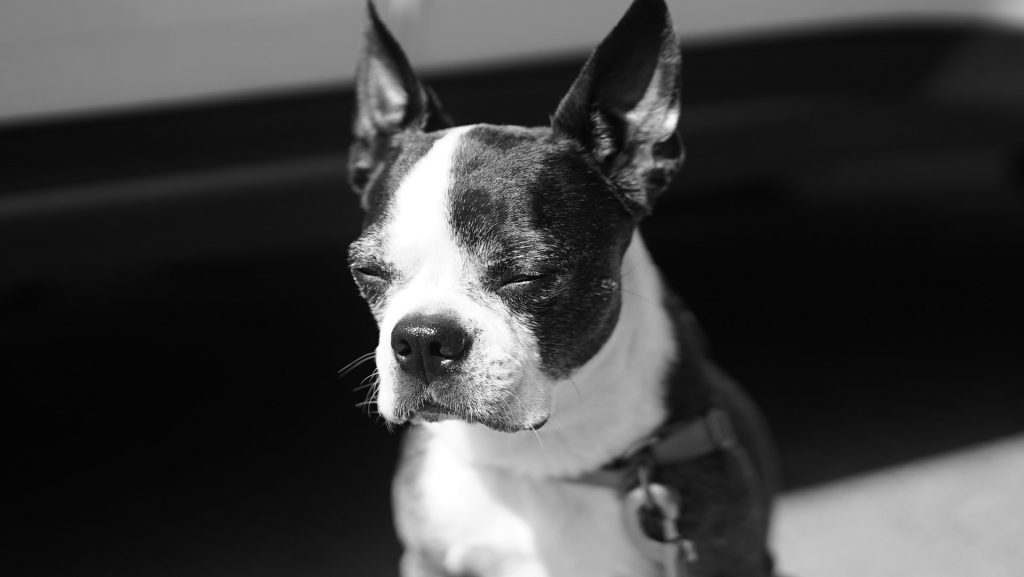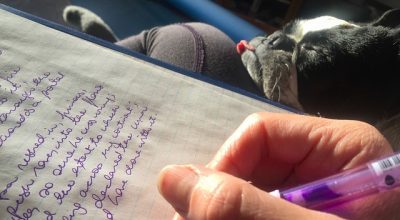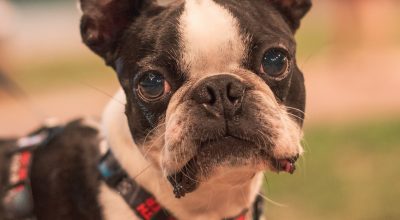Does your dog sound like something has gotten into its throat? It might be a Boston Terrier reverse sneeze. Owners of this breed have encountered this backward sneezing at least once with their dogs. It’s fairly common, but it’s important to address it right away, so your Boston Terrier won’t suffer from the discomfort.
In this post, I discussed how reverse sneezing happens, what causes it, and what you can do to help your dog.
What is reverse sneezing in dogs?

Reverse sneezing or backward sneezing occurs when the soft palate of a canine becomes irritated. Brachycephalic breeds like Boston Terriers are at high risk of experiencing this irritation, though almost any breed can suffer from reverse sneezing at some point.
In the medical world, reverse sneezing is called paroxysmal respiration. Instead of pushing the air out, the dog pulls air into its nose. The palate muscle experiences a spasm, which leads to uncontrolled backward sneezing.
Reverse sneezing may seem alarming, especially the first time you see it. However, most cases of reverse sneezing are harmless and will resolve by itself once your Boston Terrier got rid of the irritant.
As long as your dog isn’t showing abnormal behavior after reverse sneezing, there’s nothing to worry about.
What causes reverse sneezing in dogs?
Different things can trigger reverse sneezing. The following are the most common among Boston Terriers:
- Smoke. Smoke is packed with hundreds of harmful chemicals and irritants. In fact, black smoke is a combination of microscopic soot, oils, tar, and ash. When all of these get into your Boston Terrier’s nose, it will likely trigger reverse sneezing.
- Odors. Some dogs tend to reverse sneeze when sniffing specific odors. My Boston Terrier, for example, reverse sneezes whenever he sniffs citrus scents too much. This varies per dog, so it’s important to observe your pet.
- Excitement. There are Boston Terriers that will reverse sneeze when they get overexcited. Their rapid breathing could irritate their nasal passages.
- Eating too fast. Even eating or drinking too fast can trigger reverse sneezing in dogs. This happens to humans, as well, where the food may get stuck on the nasal passage and is only dislodged through reverse sneezing.
- Environmental irritants. Inhalant allergy due to pollen, grass, and outdoor elements is also a culprit to reverse sneezing. This gets worse during the summer season when pollen levels in the air surge.
- Foreign objects. Boston Terriers are spunky dogs and might get something up their nose. Paper, blades of grass, a small toy, and the likes can trigger reverse sneezing.
- Nasal mites. Other cases of reverse sneezing are triggered by nasal mites. It’s important to bring your dog to the vet if you suspect it’s infected with this parasite.
These are just some of the potential causes of reverse sneezing, but there are more possible triggers. Whatever caused it, most reverse sneezing lasts for 20 to 30 seconds. There are sneezing episodes that will stretch for a whole minute.
However, if your Boston Terrier’s reverse sneezing is happening every day and with frequent repetitions, it’s best to consult the vet. Your dog may have a more serious health condition causing the reverse sneezing.
Is reverse sneezing a sign of a more serious problem?

Most cases of reverse sneezing aren’t a cause of concern. But in rare cases, your dog may have an underlying illness triggering the reaction.
The problem occurs when your Boston Terrier’s reverse sneezing is happening too often and already affecting the dog’s quality of life.
In worst cases, excessive reverse sneezing might be a sign of the following health problems:
- Kennel cough. Kennel cough is a viral respiratory disease. It’s often transmitted on dog kennels, dog parks, and other communal canine areas. Boston Terriers with this condition will reverse sneeze and suffer from a runny nose. Nevertheless, this could be prevented through vaccination.
- Nose tumor. A nasal tumor is a cancerous condition along the nasal airway. As the tumor grows bigger, your Boston Terrier will experience pus-like nasal discharge with blood streaks as well as reverse sneezing. Over time, the dog will suffer from neurological signs like walking in circles.
- Collapsing trachea. As a brachycephalic breed, Boston Terriers have a high risk of tracheal collapse. This happens when the rings along the trachea lose their rigidity. It will make breathing difficult for the dog, thus excessive reverse sneezing.
Take note that just because your Boston Terrier is reverse sneezing doesn’t mean it already has these conditions. If you’re worried, it’s always best to consult the vet before jumping to conclusions.
How to help your dog during reverse sneezing
If your dog is in the middle of reverse sneezing, there’s something you can do to alleviate the situation.
- Gently blowing on the dog’s face. Lightly blowing into your Boston Terrier’s face will trigger the swallowing reflex. This will help stop the reverse sneeze, though there’s no guarantee your dog won’t sneeze again.
- Holding one nostril. Many Boston Terrier owners swear by this technique. You simply cover one nostril of your dog while keeping its mouth closed. It’s said that by doing this, you’re forcing the dog to breathe on one nostril alone. In my opinion, this is only effective if reverse sneezing is due to excitement or anxiety. Also, not all Boston Terriers may like the feeling of being restrained.
- Moving to a new spot. Boston Terriers often reverse sneeze due to irritants. With that, moving them to a different environment will be a good decision. Aim for an open area where your dog can get fresh air.
- Providing antihistamines. If you’re living in an area with high pollen levels in the air, you must prepare an antihistamine for your Boston Terrier. This will provide relief to your dog if it’s suffering from chronic or allergy-related reverse sneezing.
Most of the time, you could wait for your dog to stop reverse sneezing. But if any of these tips don’t work, the best person to call is your dog’s veterinarian.
How to prevent reverse sneezing in dogs
There are some steps you can take to reduce your dog’s reverse sneezing. Here are some of the tips that work for my Boston Terrier:
- Keep a hypoallergenic environment. As much as possible, control your dog’s exposure to irritants like pollen, dust, and dirt. You should make it a habit to clean your dog’s beds, toys, and other belongings.
- Get your dog checked. Whether your Boston Terrier is sneezing or not, it’s important to get the dog vet-checked periodically. You can ask the vet to closely examine your dog’s airway to check if there are abnormal growth or irregularities.
- Slow down eating. Slowing down your Boston Terrier’s eating and drinking will help prevent reverse sneezing. You can use a slow-feeding bowl to stop your dog from making big bites and big gulps.
- Don’t smoke around your dog. Smoking near your dog increases its risk of reverse sneezing. Aside from that, you’re likely giving your dog lung cancer. Besides, it’s not healthy for the both of you.
- Mind temperature changes. Avoid taking your Boston Terrier to a place with a massive temperature difference. For example, you just took your dog on a walk, then you let it enter a room with a full-blast air conditioner. This sudden change in temperature will lead to reverse sneezing.
- Check your dog’s allergies. It’s important to be aware of your dog’s allergies. This way, you can avoid triggers that will irritate your dog.
Frequently Asked Questions
Q: Can reverse sneezing kill a dog?
A: Reverse sneezing is very unlikely to kill a dog. Sure, the sneezing episodes are uncomfortable, but it won’t cause serious harm to your pet. Reverse sneezing is super common in all dogs, not just Boston Terriers.
Q: Will Benadryl help with Boston Terrier reverse sneezing?
A: Some Boston Terriers will find relief from reverse sneezing when given Benadryl. However, you should always mind the dosage. You should also consult the veterinarian, especially if your dog has underlying illnesses or currently taking medications.
Q: Is reverse sneezing a sign of kennel cough?
A: Reverse sneezing is one of the signs of kennel cough. Still, it doesn’t mean that all dogs with reverse sneezing have this infection. If reverse sneezing is accompanied by a runny nose, fever, loss of appetite, and lethargy, it’s best to get your dog checked. Vet care is necessary, especially if your dog is yet to receive its kennel cough vaccination.
Q: Why does my dog reverse sneeze at night?
A: If your dog’s reverse sneezing only happens at night, there are two possible reasons. First, your dog is probably suffering from allergies. Its bed might be harboring dust and pollens that make the canine snort during bedtime. The second possible scenario is overheating. If you notice your dog reverse sneezing on a hot day, you must perform cooling steps right away.
Q: Can anxiety cause reverse sneezing in dogs?
A: If your dog is prone to panic attacks, there’s a chance that anxiety may lead to reverse sneezing. It’s important to keep the canine calm. Training to combat anxiety will be a big help. If your efforts are not working, you can always consult a veterinarian.
Final words
Boston Terrier reverse sneezing is fairly common, but it doesn’t mean you won’t pay attention to it. Observing your dog is crucial, so you can take the necessary steps to help relieve its discomfort.
Keeping your home clean and avoiding other triggers will save your Boston Terrier from excessive inverted sneezing. You can also consult the vet for possible medications that could help your pet.
Have you ever encountered reverse sneezing on your dog before? How did you handle it? Share your tips below!

